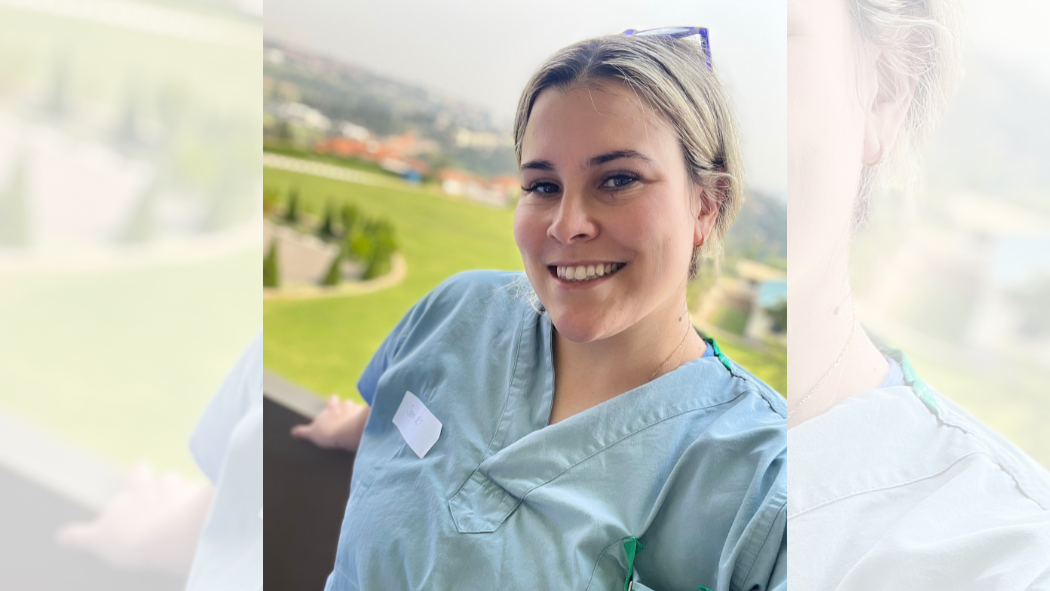
July 3, 2024
Samantha DaCosta, Charge Technologist – Registered Respiratory Therapist (RRT) in MSICU and CSICU at London Health Sciences Centre (LHSC) went to Rwanda twice in the last few years with her most recent experience being in 2023. As part of a team of medical professionals, Samantha was able to provide valuable expertise for the new Canadian-Rwanda Open Heart Project to help build an open-heart surgery program.
“Rwanda doesn’t have an open-heart surgery program and many individuals requiring cardiac surgery are forced to travel to India,” explains DaCosta. “Not only is that a long trip, even for someone without a heart condition, there are other barriers, such as cost, that may impact whether a person is able to get the surgery they need. I wanted to help be a part of the solution for building such a highly needed program in Rwanda.”
The group that DaCosta traveled with is from Halifax, Nova Scotia. She became involved with them after a coworker recommended her. “The team was looking for an RT with anesthesia assistant qualifications in Halifax, and a physician colleague here at LHSC, who also volunteers with this group, recommended me. As an avid learner and leader in my role at LHSC, my skillset matched the desired qualifications for the position in Rwanda.”
After filling out the required paperwork, getting a medical license for Rwanda and all of the necessary vaccinations – DaCosta was going to Rwanda.
“I only knew the physician in passing, so the first time I went to Rwanda was a little overwhelming. I didn’t know a soul,” says DaCosta. “But everyone was so easy to get along with both personally and professionally when working together in Rwanda.”
In Rwanda
“When we go on these missions, we go for 10 days. We see a lot of the same people because we attend the same hospital – which is great for establishing and growing relationships,” DaCosta shares.
On the first day, they set up the ICU in conjunction with the Rwandan nurses. They also do patient selection.
“We can only take so many cases within that short time frame,” DaCosta explains. “But a lot of Rwandan heart patients are younger compared with Canada – they are often under 40 years old – so we are prolonging their life considerably. It feels really good to be able to help people get care they may not otherwise have received.”
In the patient selection, the poorer and sicker patients are prioritized – for example, those who couldn’t afford to get to India or who live in rural areas and don’t have the means to travel that long of a distance.
After patients are selected, the group, with the Rwandan health-care practitioners, perform operations for five to six days.
“The Rwandan teams are amazing to work with and they really value the role of the RT. Since the RT and anesthesia assistant roles don’t exist in all areas around the world, including Rwanda, the nurses or anesthesiologists usually take on those extra responsibilities. But that’s a lot of extra work for those roles that already have a lot to do, and now they want their own RTs!”
As an RT, DaCosta teaches the nurses in Rwanda about rudimentary ventilation. Because the physicians and nurses share ventilator responsibilities, DaCosta shows both groups how to ventilate post-operation cardiac patients and how to extubate quickly when the patient is woken up, among other critical duties.
But the learning is not only one-sided. The first time DaCosta went, she had to become accustomed to equipment she was not used to using. There is a mix of both older and newer equipment used in the hospital they visit.
“There were some pieces of equipment I was used to using, and there was a bit of a learning curve for others the first time,” says DaCosta. “But one thing of note - they are very environmentally conscious and are going to go completely paperless soon. Overall, it’s very interesting to learn about their processes and equipment during my visits.”
DaCosta’s favourite days were at the end of the week when patients no longer have the tubes and wires and they are close to being discharged from the ICU. “They’re just hugging you, crying and so grateful for receiving this level of care so close to home,” says DaCosta. “It’s really impactful and it’s clear we are making a difference in their lives by helping those that wouldn’t otherwise get the help they need.”
Access to safe and world-class care for patients within and outside of LHSC’s walls is something DaCosta believes in. These medical missions she takes part in are volunteer and donor based. The care does not cost those in Rwanda anything.
On the last day, the Halifax team cleans up and as they say their final goodbyes to patients and practitioners, they make sure everyone is doing okay before leaving.
“I hope to continue going on these medical missions to be a part of building an open-heart surgery program in Rwanda because I see the need that exists,” DaCosta shares. “Rwanda is a beautiful country with incredible people and it has been a pleasure meeting people who have become life-long friends along the way.”
